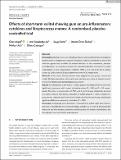Please use this identifier to cite or link to this item:
http://hdl.handle.net/11547/11266| Title: | Effects of short-term xylitol chewing gum on pro-inflammatory cytokines andStreptococcus mutans: A randomised, placebo-controlled trial |
| Authors: | Topaloglu;, Aslı |
| Keywords: | STREPTOCOCCUS-MUTANS DENTAL-CARIES |
| Issue Date: | 2020 |
| Series/Report no.: | 74;9 |
| Abstract: | Introduction Dental caries is an infectious disease with predominantly of cariogenic bacteria such asStreptococcus mutans(S mutans). Xylitol is considered as one of the effective agents that can limit this dental infection. In this randomised, placebo-controlled trial, we aimed to evaluate the potential reflection of short-term xylitol consumption on pro-inflammatory cytokines (TNF-alpha, IL-6 and IL-8) andS mutanscounts by ELISA and qPCR (Quantitative real-time PCR), respectively. Methods In this study, 154 participants were assigned to two groups, control and xylitol. Dental examination, saliva and swab samples were done at baseline and at 3-week for clinical and microbiological assessment. Results In xylitol group at the end of 3-week, gingival and plaque index scores were significantly decreased with respect to baseline values (P P < .05, respectively). The salivary concentration of TNF-alpha, IL-6 and IL-8 were statistically declined at 3-week, more so than those at baseline in xylitol group (P < .001).S mutansexpression was reduced about fivefold at 3-week use of xylitol and it was a statistically significant difference compared to baseline (P < .001). Conclusion Intriguingly, even short-term consumption of xylitol might play a favourable role in maintaining the oral health status, possibly as a result of decreasing the release of pro-inflammatory cytokines and the counts ofS mutans. Nonetheless, this investigation warrants further endorsement. |
| URI: | http://hdl.handle.net/11547/11266 |
| ISSN: | 1368-5031 1742-1241 |
| Appears in Collections: | Web Of Science |
Files in This Item:
| File | Description | Size | Format | |
|---|---|---|---|---|
| Int J Clinical Practice - 2020 - Akgül - Effects of short‐term xylitol chewing gum on pro‐inflammatory cytokines and (1).pdf | 874.67 kB | Adobe PDF |  View/Open |
Items in DSpace are protected by copyright, with all rights reserved, unless otherwise indicated.
